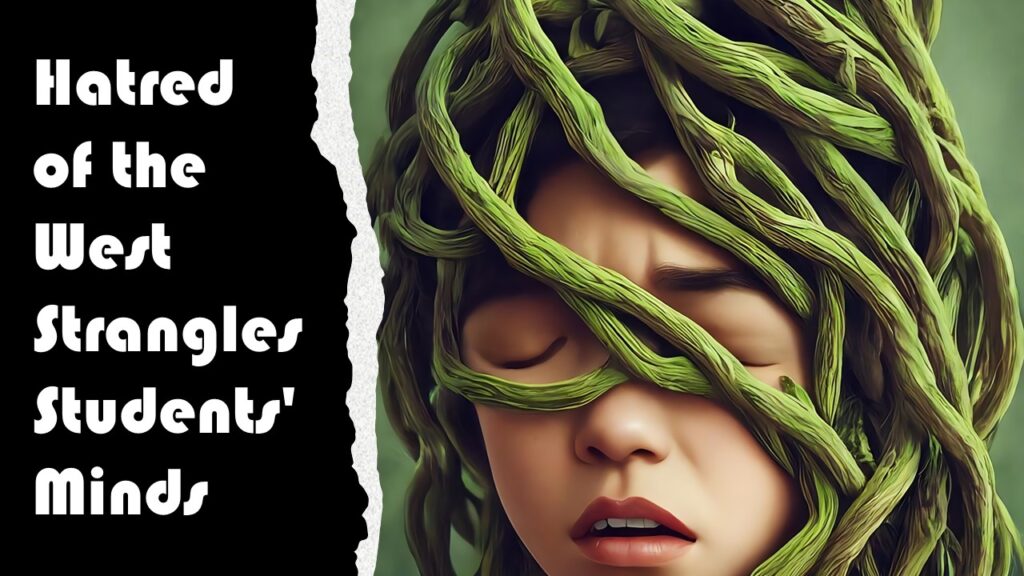In The Spectator, Peter W. Wood laments the growth of invasive anti-Western hatred on college campuses, likening it to an invasive species that’s impossible to eradicate. He writes:
The idea that Western civilization ushered in an age of oppression, cultural destruction, environmental degradation and all manner of human exploitation, is bittersweet. I don’t mean that it tastes like coffee or dark chocolate. I mean bittersweet the vine, Celastrus orbiculatus, with the colorful orange-red berries. This kind of bittersweet grows at a phenomenal rate, ascending into the canopy and strangling trees. If you drive north out of New York City, you will pass endless miles of arboreal carnage. Tens of thousands of roadside trees are draped in the deadly vine. It is an invasive Asian species that, once established, is impossible to eradicate. And while its fall berries are attractive and make for good floral arrays, they are inedible.
Hatred of Western civilization is the bittersweet of the college curriculum. It is an invasive idea that once ensconced in the classroom strangles every other idea in the minds of many students. It reduces the world into a neat division between the Evil West and the Innocent Rest. In this arrangement, the latter maintain their innocence no matter what they do. Hamas is but the latest beneficiary of this indulgence. Montaigne found nobility in his 1590 essay, “Of Cannibals,” in the Brazilians who cooked their enemies for food. Western intellectuals been busy ever since devising excuses for those who prize primitive appetite over civilized rule.
This romancing of the barbaric is helped along by the ease of finding plenty of episodes in the Western past — and present — in which civilization failed to prevent our descent into horrific acts, or worse, the perpetrators of horrors announced they were indeed the agents of civilization. Were the Argives at Troy civilized? The Athenians of the Peloponnesian wars? There is no shortage of savagery in Western history, up through and including slavery, genocide and world war.
So by what stretch do we call ourselves civilized and mean by that something good? That question is the seed of the bittersweet vine that will strangle all education if we let it in.
Therefore, it is best to answer the question. We are civilized because we recognize a sovereign God of justice and mercy. We are civilized because we recognize that the universe is governed by laws that can be discovered through rational inquiry. We are civilized because we have harnessed the powers of literacy and mechanical innovation. We are civilized because we conceive all of humanity as possessing fundamental dignity. All of these are perfectly good answers and, of course, they are all part of endless and unresolved dispute. To be civilized is to take that dispute seriously. Whether we are under God’s laws or a godless nature’s laws; whether we possess spiritual kinship or merely biological affinity; whether we are accidental “winners” by virtue of guns, germs and steel, or the purposeful champions of higher values, we the civilized are always struggling to say what that means.
The uncivilized are those who sneer at the whole idea. They go for the easy answer that civilization is just the exercise of brute power by those in a position to exert it, though they typically disguise their domination by spreading lies to control the minds of those they oppress.
This is, I confess, a hurried lesson in how the anti-civilization forces have gained ground in higher education. Their primary teaching is that Western civilization is a terrible thing, but its terrors can only be seen clearly by those who have learned how to see through the illusions by which it shields itself from critical examination. The purpose of higher education, in this view, is literally to dis-illusion students. They need to acquire sufficient cynicism to free themselves from Western civilization’s constant efforts to raise itself up as good. “Wokeness” is acquired by spitting at those efforts.
Anti-civilization now has a strong grip on most of our colleges and universities. In what I will venture to call the post-Gay era — as in Claudine, not LGBTQ — however, we are seeing some signs of civilization getting back on its feet. The latest of these is a bill introduced in the Utah legislature, SB-226, which would, to quote Stanley Kurtz, “restore the kind of Great Books curriculum centered on Western civilization, American history, and civics that was central to American higher education until the past few decades.”
The bill, the “School of General Education Act,” has a long way to go before becoming law, but as far as I know, it is the first serious attempt in our era by a state legislature to insist that all students in a state’s public university system take a prescribed sequence of courses that will take them through most of Western history from Homer to Hannah Arendt and beyond. Kurtz’s explanation is better than any I can provide, so I will leave that to him. But I should acknowledge that one of my staff at the National Association of Scholars, David Randall, a historian of Western civilization, is among those who drafted a model curriculum that the Utah legislators appear to have studied.
Read more here.
If you’re willing to fight for Main Street America, click here to sign up for the Richardcyoung.com free weekly email.






